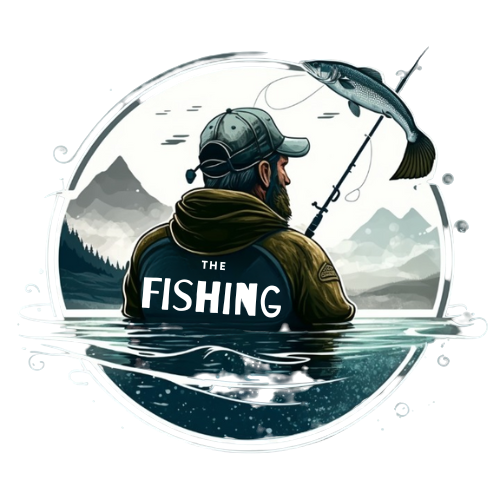Feeling seasick on a fishing boat can quickly ruin an otherwise enjoyable trip. The unpleasant nausea, dizziness, and vomiting that comes with seasickness is something most people want to avoid at all costs.
But with some preparation and knowledge of what causes seasickness, you can prevent it from happening and have a great time fishing on the open water.
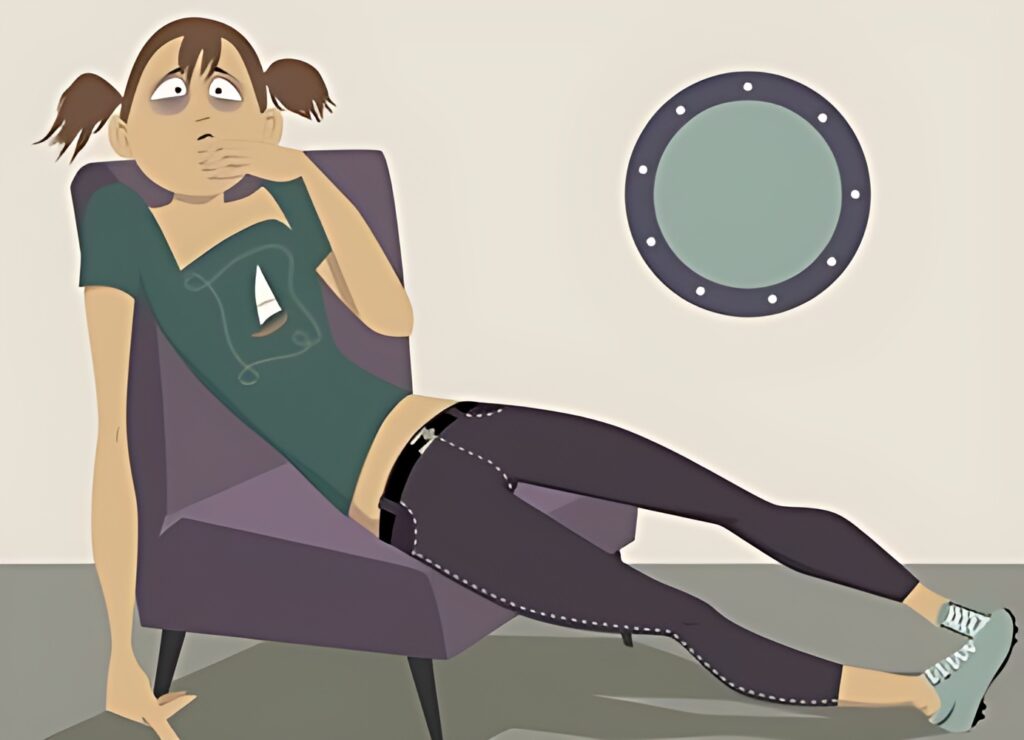
In this comprehensive guide, I will dive into all the techniques for avoiding seasickness when fishing offshore or in other bodies of water.
You’ll learn what factors on a boat contribute to nausea and vomiting and get science-backed tips for both preventing and treating motion sickness while fishing. Follow these recommendations to keep your seasickness at bay.
Seasickness, also known as motion sickness, is a common occurrence out on the ocean. It stems from the rocking motion of waves, which creates conflicting signals to your senses and brain that then manifest as nausea and dizziness. Though not dangerous, it can completely ruin a fishing expedition.
Let’s dive in to this complete deep dive on avoiding seasickness!
Table of Contents
What Causes Seasickness on Fishing Boats?

Seasickness occurs due to the rocking motions of waves on a boat conflicting with what your eyes see. When your inner ear sends different signals than your eyes, it causes dizziness and nausea.
Your inner ear contains fluid and motion sensors that detect changes in motion, direction, and equilibrium. When a boat rocks, your inner ear senses the changing motion.
But your eyes do not see the motion changes in the same way. They see a stationary horizon line and fixed objects on the boat.
This sensory mismatch between what your inner ear feels and your eyes see causes seasickness symptoms to occur.
Sitting still and staring at one spot seems to make seasickness worse. Looking out at the horizon helps resolve the conflict.
Larger wave action on windier days exaggerates the boat’s rocking motion, making seasickness more likely.
Being down in a closed cabin intensifies seasickness in some people due to lack of visual reference.
Standing or walking around causes more inner ear disturbances, so staying seated is better.
How to Not Get Seasick on a Fishing Boat: Tips to Stop
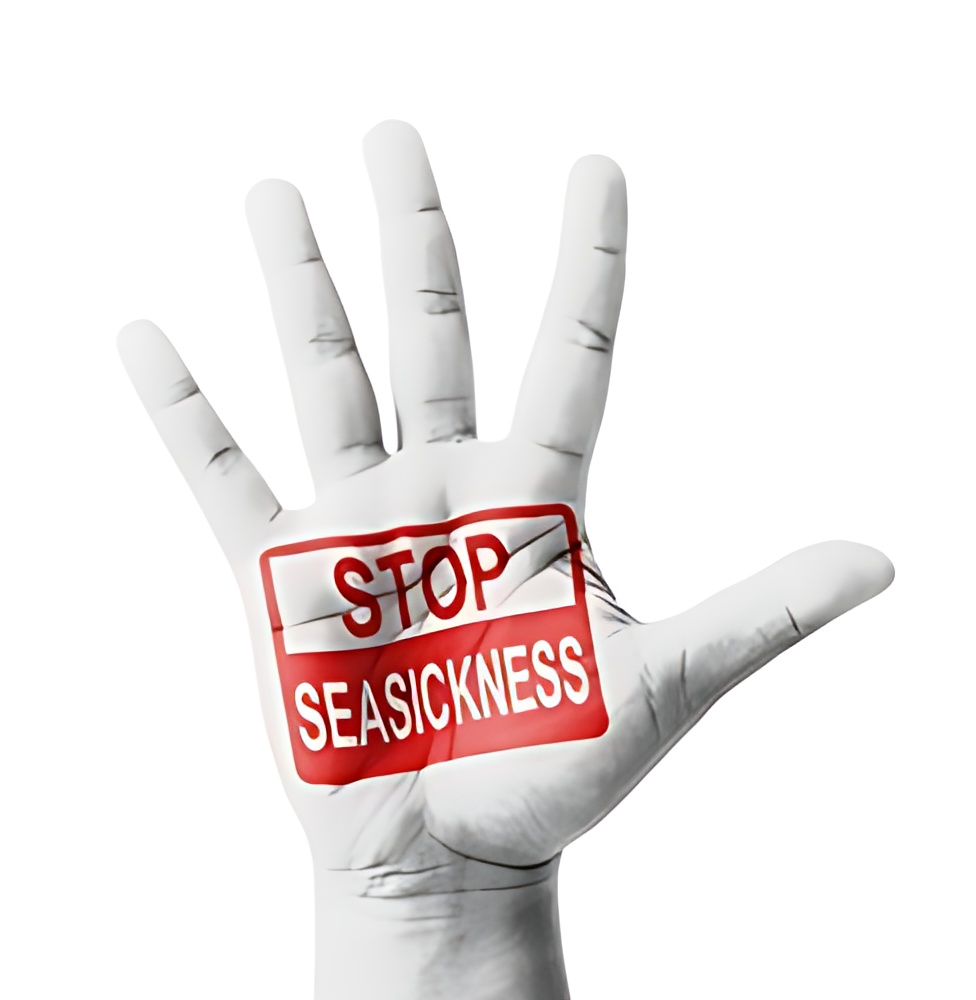
Here are the some tips to prevent seasick on a fishing boat:
- Take an over-the-counter seasickness medication like Dramamine, Bonine, or meclizine at least 30 minutes before departing. This is one of the most effective ways to prevent nausea.
- Get seasickness relief wristbands that use acupressure, like Sea-Bands. Place on acupressure point on each wrist.
- Have ginger candies, ginger ale, mint, or peppermint to help settle your stomach.
- Get a full night’s rest before the fishing trip. Being well-rested makes you less prone to seasickness.
- Hydrate by drinking plenty of water and electrolyte drinks like Gatorade before and during the trip. Dehydration makes symptoms worse.
- Eat a light meal before leaving shore. Greasy, spicy, or heavy foods can trigger seasickness.
- Avoid alcohol, caffeine, and cigarette smoking, which can worsen nausea.
How to Avoid Seasickness While Fishing?
When actively fishing offshore, there are several techniques you can use to avoid and minimize seasickness episodes.
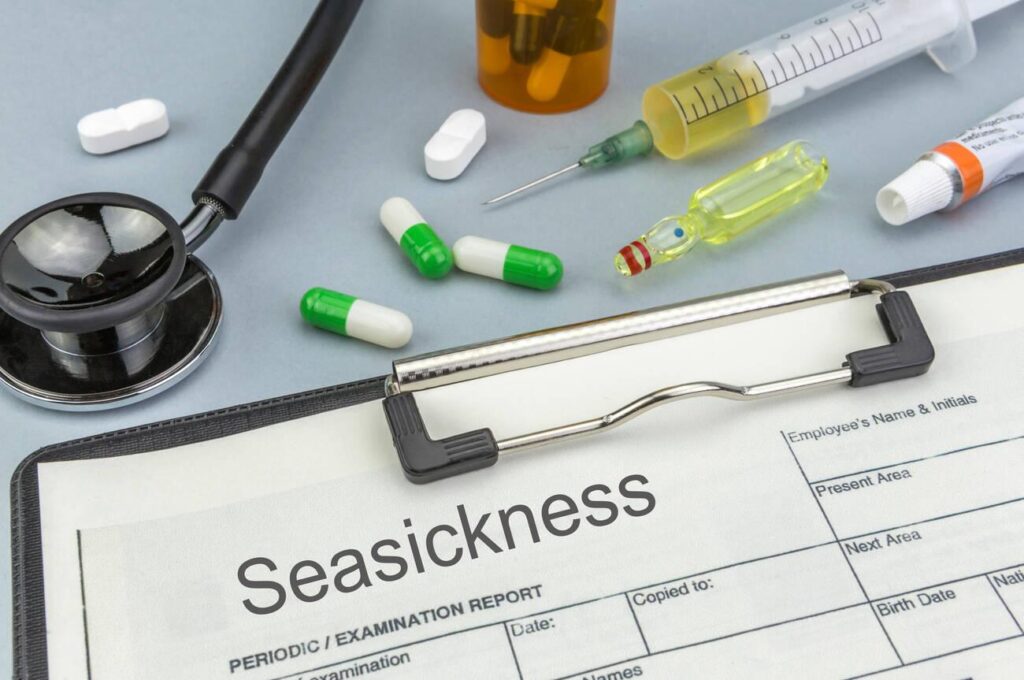
One of the most important things is to choose larger, heavier boats over 20 feet long that will rock less severely in the waves compared to smaller boats.
The broader beam width and heavier displacement of bigger vessels creates more stability in the water. Once onboard, try to sit near the center of the boat, as this is usually the area with the least amount of rocking motion.
Being farther from the bow or stern reduces side-to-side movement. Getting fresh air is also hugely beneficial, so sit on the open deck when possible rather than remaining below deck in enclosed cabins which can intensify seasickness by limiting visual references.
While fishing, keep your eyes focused steadily on the horizon line, which establishes a fixed visual reference point that reduces sensory mismatch between your eyes and inner ear.
Take regular 15-20 minute breaks from actively fishing to relax your body and mind, as constant focus for hours on end can mentally and physically drain you.
During these breaks, you can close your eyes, stretch, breathe deeply, rehydrate, and eat small snacks to replenish.
Avoid walking around the boat unnecessarily, as excessive movement disturbs your inner ear’s sense of equilibrium.
Distracting yourself with conversation, listening to music, or audiobooks can also help take your mind off the waves.
Implementing preventative strategies like these while fishing can help avoid seasickness episodes and keep nausea at bay.
Seasickness Remedies to Use on the Boat
- Take additional seasickness medicine like Dramamine if you start feeling unwell.
- Apply a Scopolamine patch behind your ear several hours before departing shore.
- Use natural remedies like ginger, mint, lemon to ease nausea.
- Drink cold, carbonated beverages like 7Up, ginger ale, or Coke. The bubbles and cold soothe the stomach.
- Eat plain crackers or bread to settle your stomach if you can keep it down.
- Lie down, close your eyes, and focus on deep breathing to limit boat motion sensations.
- Use acupressure wrist bands if you start feeling queasy.
You may also like to know: 7 Tips On How To Prevent Sea Sickness While Fishing
Treating Seasickness After Symptoms Start
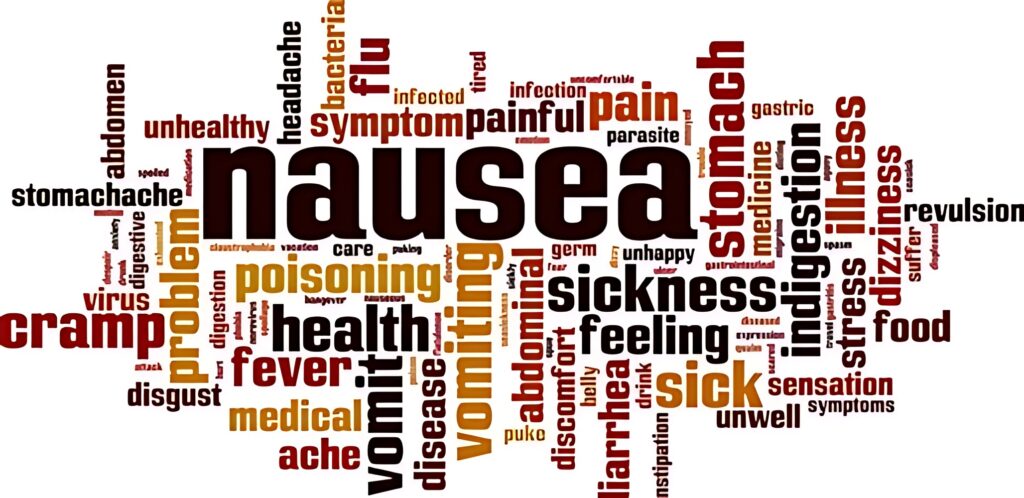
At the first signs of nausea or dizziness, immediately take seasickness medication if you haven’t already.
Go below deck to the cabin and lie down to limit exposure to rocking motions. Close your eyes.
Focus on slow, deep breathing while picturing the horizon to calm your mind and body.
Apply a cold, wet rag or ice pack to your forehead, neck, and chest to soothe nausea.
Drink water and electrolyte drinks like Gatorade to prevent dehydration from vomiting.
If able to keep it down, eat a few plain crackers or dry bread to settle your stomach.
For severe vomiting and nausea, have the boat return you to shore for medical treatment.
FAQs:
What Is The Best Seasickness Medicine For Fishing?
The most effective seasickness medicines for fishing contain the active ingredients meclizine or scopolamine. Meclizine brands like Dramamine Less Drowsy, Bonine, and Antivert are good over-the-counter options that can be taken before and during a fishing trip. Scopolamine patches like Transderm Scop work when applied several hours before departing shore. Both meclizine and scopolamine work to reduce nausea, vomiting, and dizziness from motion sickness.
Can You Train Yourself To Not Get Seasick?
Yes, you can train your body and mind to better tolerate the motion of boats and reduce seasickness. Techniques include repeatedly exposing yourself to short boat trips to build tolerance, learning to visualize the horizon rocking with the boat, taking preventive medication, using acupressure bands, and learning relaxation exercises.
Does Motion Sickness Get Worse With Age?
Motion sickness susceptibility can increase with age due to degeneration of the inner ear balance organs and slower adaptation to motion changes. Children under 2 are less prone to seasickness, while susceptibility peaks around 9-10 years old. After age 50, age-related balance issues can cause more seasickness problems.
Conclusion
By understanding what causes seasickness and employing prevention methods like choosing the right boat, medication, stabilizing your vision on the horizon, and treating symptoms quickly, you can have smooth sailing on your fishing trips. Prepare in advance, treat nausea early before it worsens, and stay positive. Focus on enjoying your time out on the relaxing waves.
With this complete guide, you now have a seasickness toolkit to prevent it from ruining your precious time fishing offshore. Stay centered, remain hydrated, take breaks, and keep your eyes on the prize – bringing home your fresh catch!
